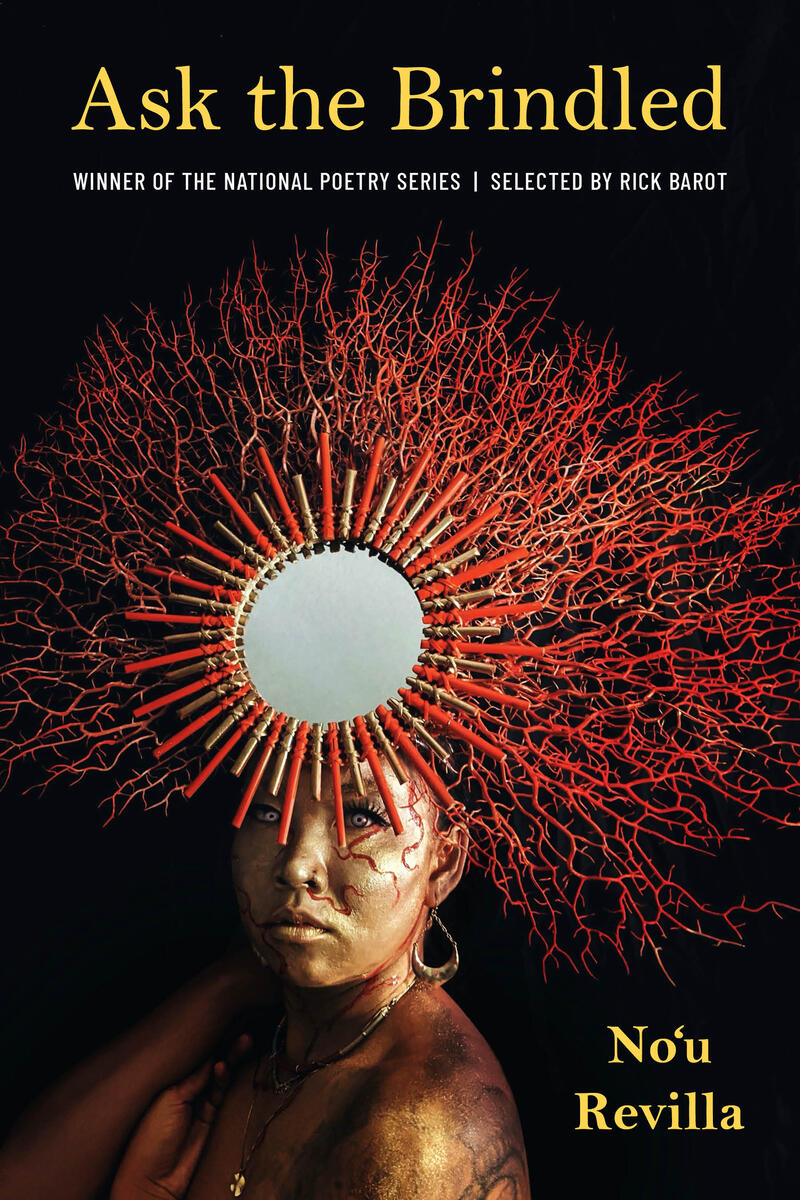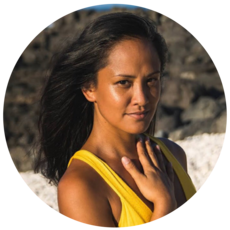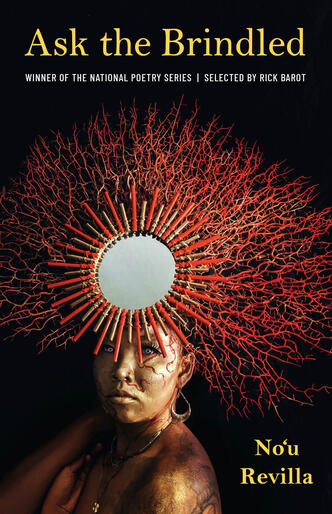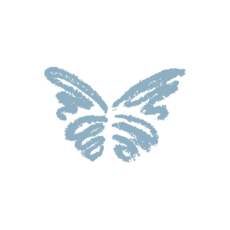letters to the gut house: collaboration & decolonial love in Hawaiʻi | A Cover Image Story

Cover art by Jocelyn Kapumealani Ng; Cover design by Mary Austin Speaker
Essay by No‘u Revilla & Jocelyn Kapumealani Ng
In Hawaiʻi, moʻo are water protectors. They are also shapeshifters who can choose lizard and wahine (woman) forms. For me, moʻo are models of erotic sovereignty and transformative healing. Throughout my debut poetry collection Ask the Brindled, moʻo carry important questions: what could it look like for wāhine to practice sovereignty of their bodies? To practice sovereignty of who they love and how they choose to build a family? For me, cultural figures like moʻo remind us that Hawaiians are not only worth protecting, we are also worthy protectors.
dear joce, i write to you because you dismantle
binaries between sacred and obscene. in the materiality of your transformations, i meet wilder language for decolonial love. this is a love letter to collaboration. to the way my body opens to your hands.
Since moʻo are my ancestors, many of the poems in Ask the Brindled feel like smuggled love notes from my kūpuna across oceans and generations. The word smuggle echoes the creative resistance of my people and our last reigning monarch, Queen Liliʻuokalani. Before the illegal overthrow of the Hawaiian Kingdom in 1893 by the United States, Liliʻuokalani was imprisoned in her own palace under false charges. She was denied reading material and any knowledge of political events in the kingdom. To maintain communication with their queen, ʻŌiwi supporters smuggled newspapers into her hands by wrapping them around bouquets of flowers, which they gathered from her garden at Uluhaimalama.
The stories of my ancestors teach me how resistance innovates contact. These love notes throb from a “we” that is ancestor affirming, sex positive, aloha ʻāina, and moʻolelo fluid. In Hawai’i, our decolonial narratives are many-bodied and many-named.
dear noʻu, we do not exist in the linear.
we sit and collect our sheddings, make skin for the next generation. in creation, i begin at the end: after all has been said and deconstructed, after tears, after gratitude, in the echoes of clanging green bottles and the sucking of fish from bone. we are ancestors and descendants simultaneously.
Because my kūpuna raised me right, collaboration feeds my writing practice. Jocelyn Kapumealani Ng is my collaboration soulmate. As queer ʻŌiwi femme creatives, we both use art to uplift and ask better questions of shapeshifters. We return to our own bodies to make — and to make possible — decolonial love. A Hawaiian multi-dimensional artist, Jocelyn uses special effects make-up and digital photography to transform people into their own mythic figures. Importantly, her practice is based on dialogue and trust. She asks for your reasons. Why do you come to be transformed? Why this myth? Why this body? As I wrote and re-wrote Ask the Brindled, Jocelyn and I worked together to dig deeper into moʻo mythology, moʻo poetics, and queer ʻŌiwi femme approaches to art.
dear joce, did you know i come from waiʻehu?
in english, the name of my childhood home means ocean spray. it feels like you knew that all along. aiming your spray gun at my feet to render me lizard. for scales, we used duct tape and fish net stockings. special ordered greens and blacks. my extremities, you dusted in gold.

Pictured: No‘u Revilla; Credit: Jocelyn Kapumealani Ng
Richard Hamasaki told you: “Keep it DIY. They can take away money, resources, people to help you. But if you can still create with whatever you can find and the foundational equipment of your craft all by yourself, then you’ve really mastered something.”
dear joce, there are eight directionals in our language.
eight, like spiders. when i was young, my grandmother taught me about lizards and spiders. that we are lizards and we eat spiders in order to live. “we eat them, girl. we eat them.” did she know even then how my hunger would touch other women? did she prophesize the way you and i would touch each other in art and language? before touching me again, you tell me you’re teaching yourself how to make scars. what you meant was third degree silicone. what i heard was cecilia vicuña, and you were going to teach us all how to travel from wound to wounderment.
dear no‘u, with you my guts say yes.
the art of shapeshifting is temporary and hyper ephemeral. it is a calling we do not get to decide when to answer. some call it make-up. i call it a trance, a prayer, a poem. creating has always been otherworldly. in transformation, i craft a vessel in which your stories can move. this is how i witness the gods in me live: new worlds, old worlds colliding.
In shapeshifting, we are vessel and anti-vessel simultaneously. On the one hand, a vessel can be a thing to pour with, an ancestral tool. On the other hand, as Hawaiians know, vessels can also be ships filled with syphilis and war. To be in transformation, then, is to awaken the 4, the 40, the 400, the 400,000 gods inside of you to become more legend, to become more of your father’s father’s memory, more ancestors knocking at the door, more future reaching for you, more story unraveled.
dear joce, do you remember when you opened my skin for the first time?
i told you to put your hands on me. like you’re peeling my skin, i clarified. so you trained your fingernails on the in-between of the skin i was born with and the skin you sculpted along my shoulder. “like this?” you asked. “or,” then lengthening your arms and kissing the floor with your knees, you turned your fingers into hooks, “like that?” suddenly i was convinced somewhere my grandmother was talking to god.
Before the pandemic, I came to understand the three most tender, nearly painful words a person can say to me: “I believe you.” Belief is a structure of feeling as well as action. Belief is a practice of connectivity. “I believe you” means I will stand with you. Together we rise, refusing our own burials.
dear no‘u, when the world is on fire
our community is radical hope. with bryan, i watched him become ‘aumakua, and for the first time i heard a shark scream. with lyz, i saw butterflies emerge from chrysalis with burning wings. with anjoli, i marveled as gold tigers from her father’s homeland rebirthed themselves. with cj, a dragon sat at the edge of the world, holding itself tender. wih keali‘i, kanaloa swam in and out of his face. you and i build the gut house. locks, keys, doors, and rooms filled with all our naked, all our magic and survival. this is the greatest love letter.
We descend from wāhine who win wars with kukui nuts; wāhine who chew, spit & bark; wāhine who flicker like lehua after a hard rain. We come here with our bodies, which means we come here with our lands. Aloha is not straight.
dear joce, the proximities you govern
between beauty & fear; mutilation & growth; monster, queer, woman, Native. you remind me of a woman who once recited three principles by which she lived: fuck, feed, and listen. she was six feet tall, with hair like a nest of ʻōʻō birds. when she spoke, a forest emerged. when she laughed, the forest burned. because sometimes destroy means create.
dear no‘u, i love you in every metamorphosis.
we live in a world that works so hard to erase us. i will work twice as hard to offer you skin that sees you through this world and the next. again and again. because when i see you, i see parts of myself that i grew up yearning to see. because the truth is when we can see ourselves, this realm gets a little less lonely and a little more free.
dear joce, I love
dear noʻu, I love
I love what happens to my body in your hands.


